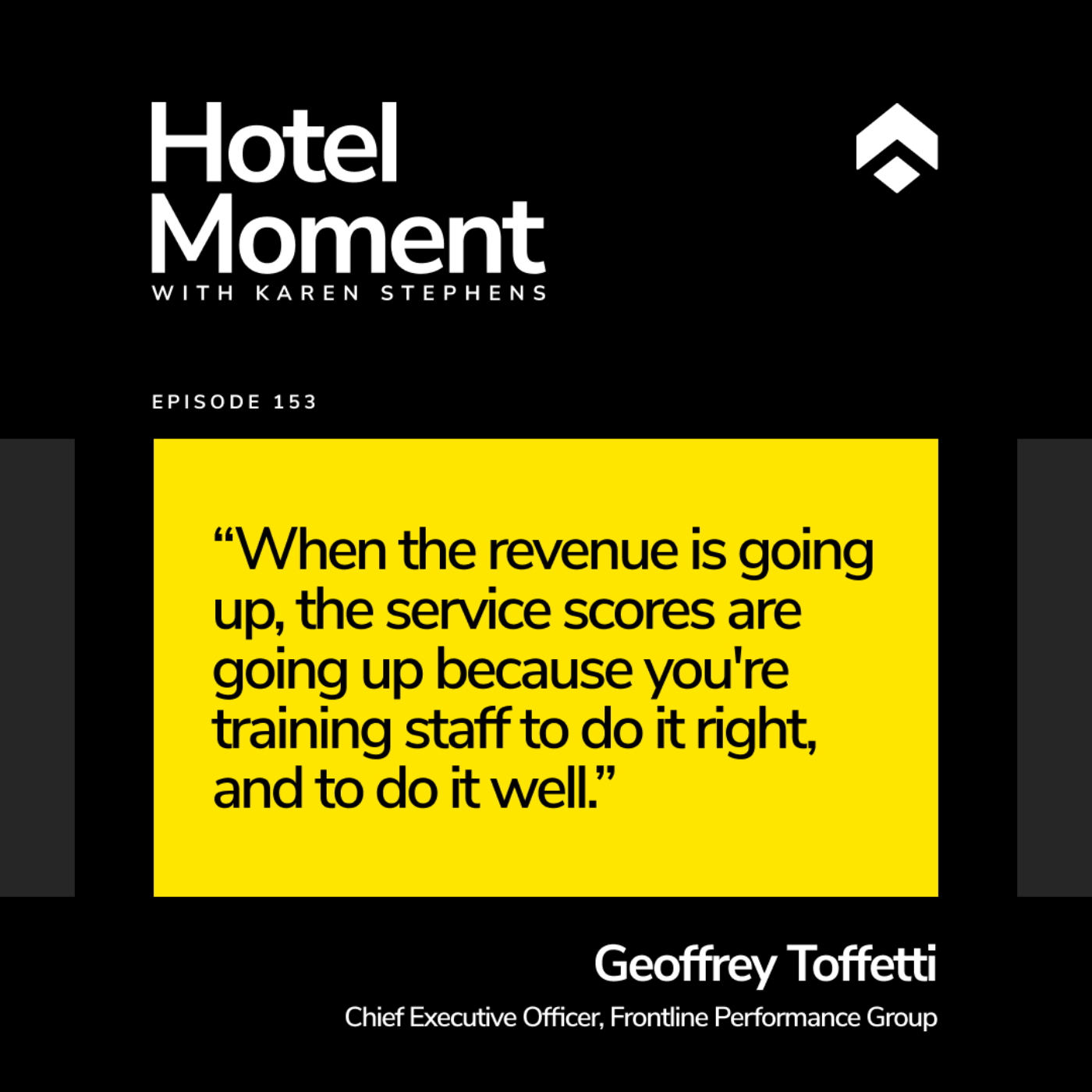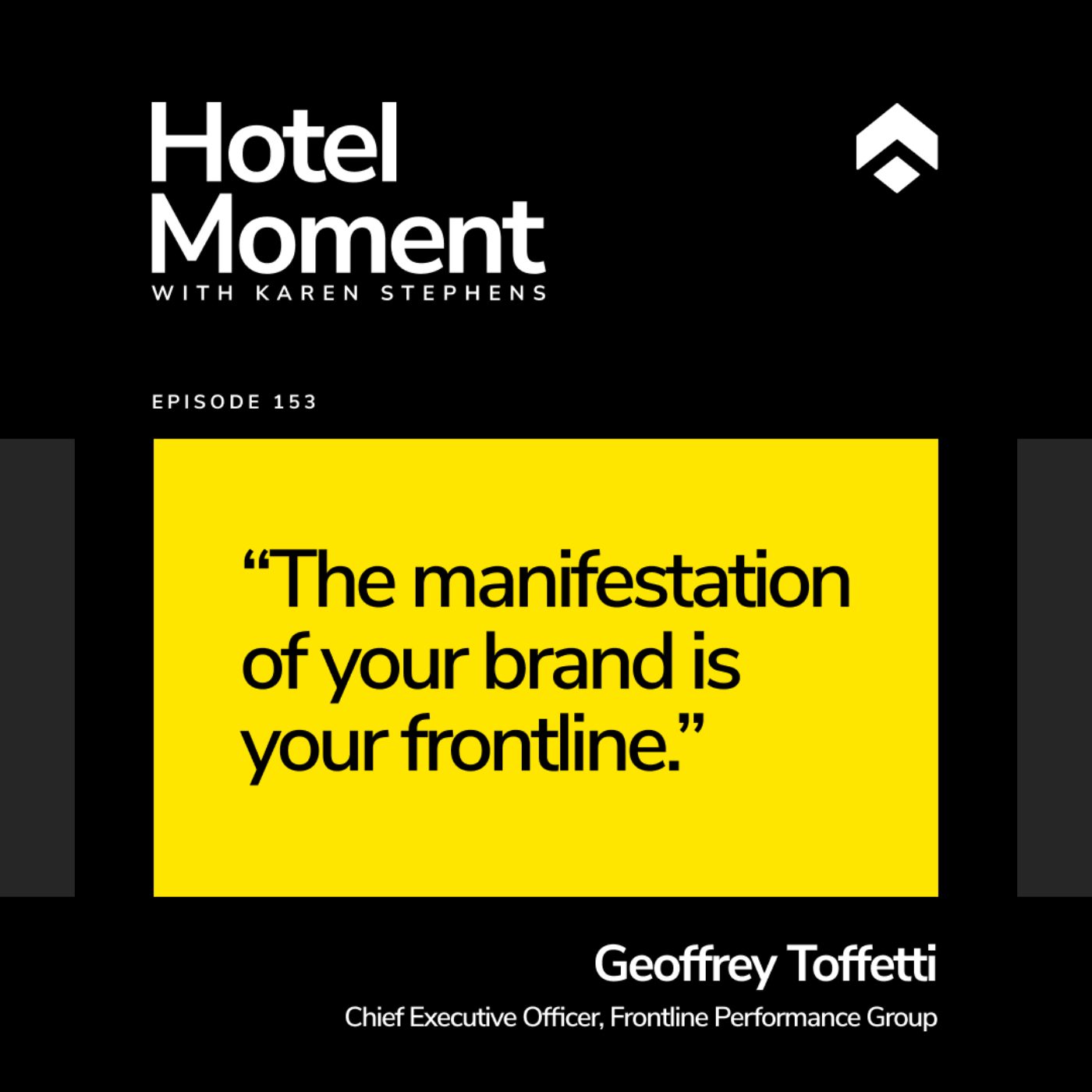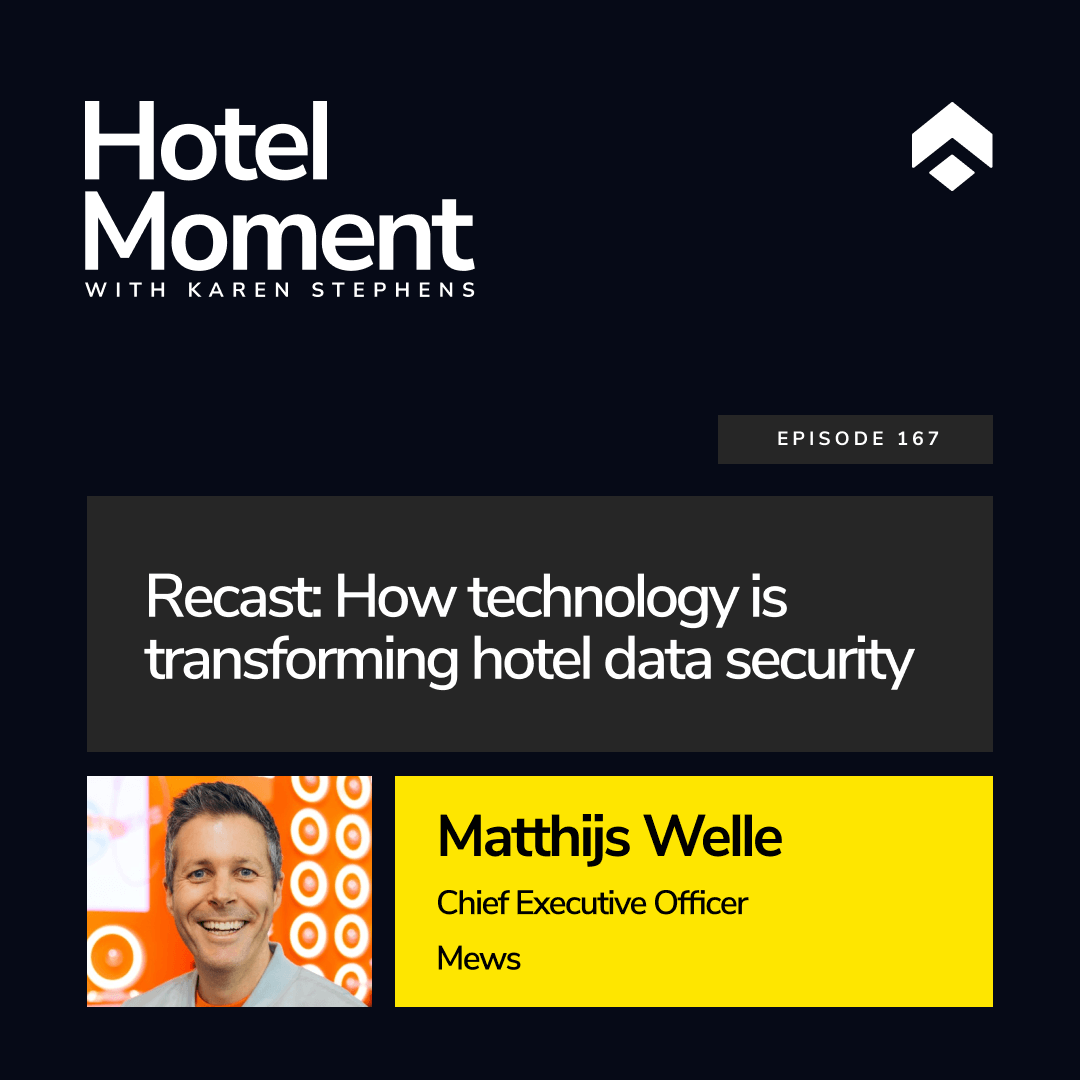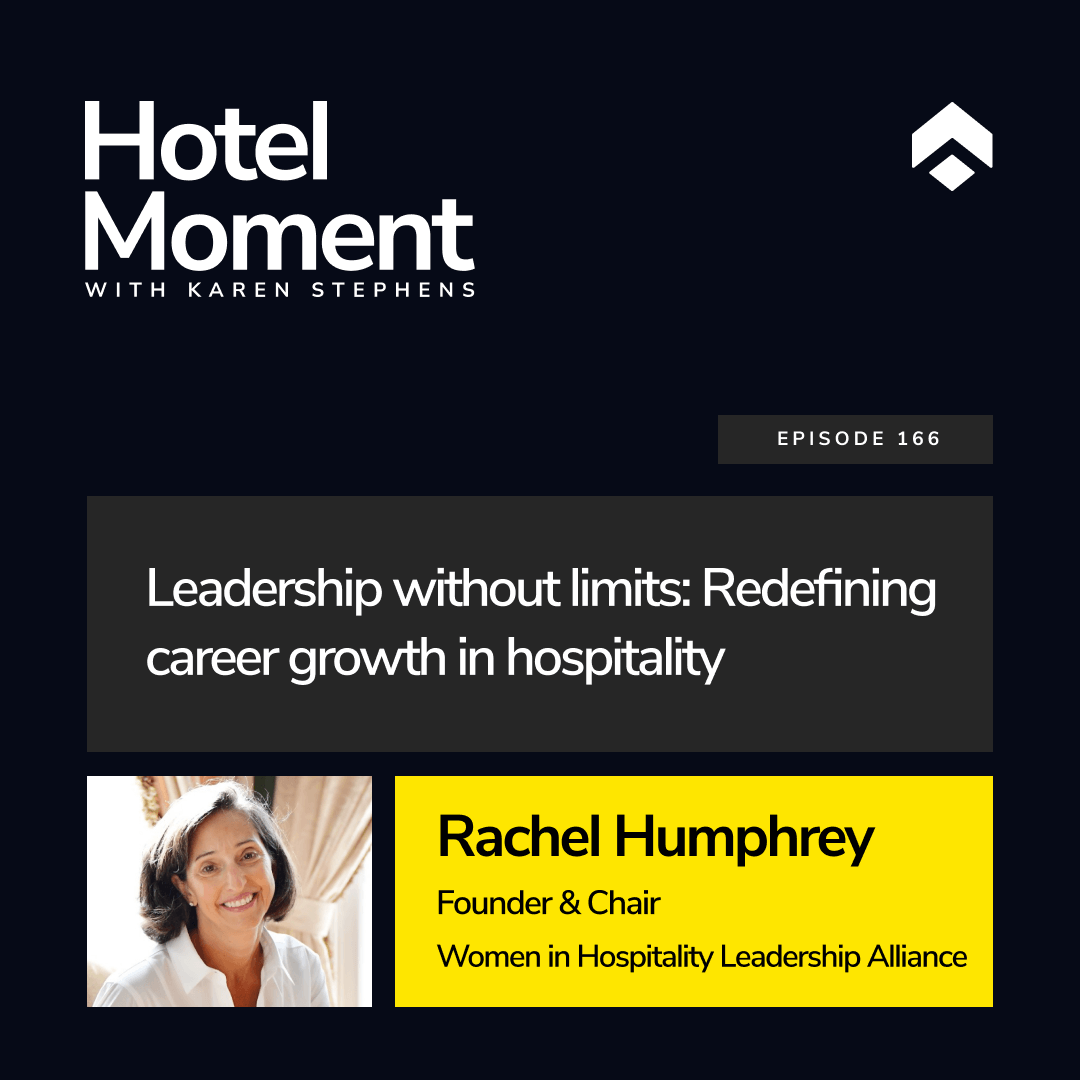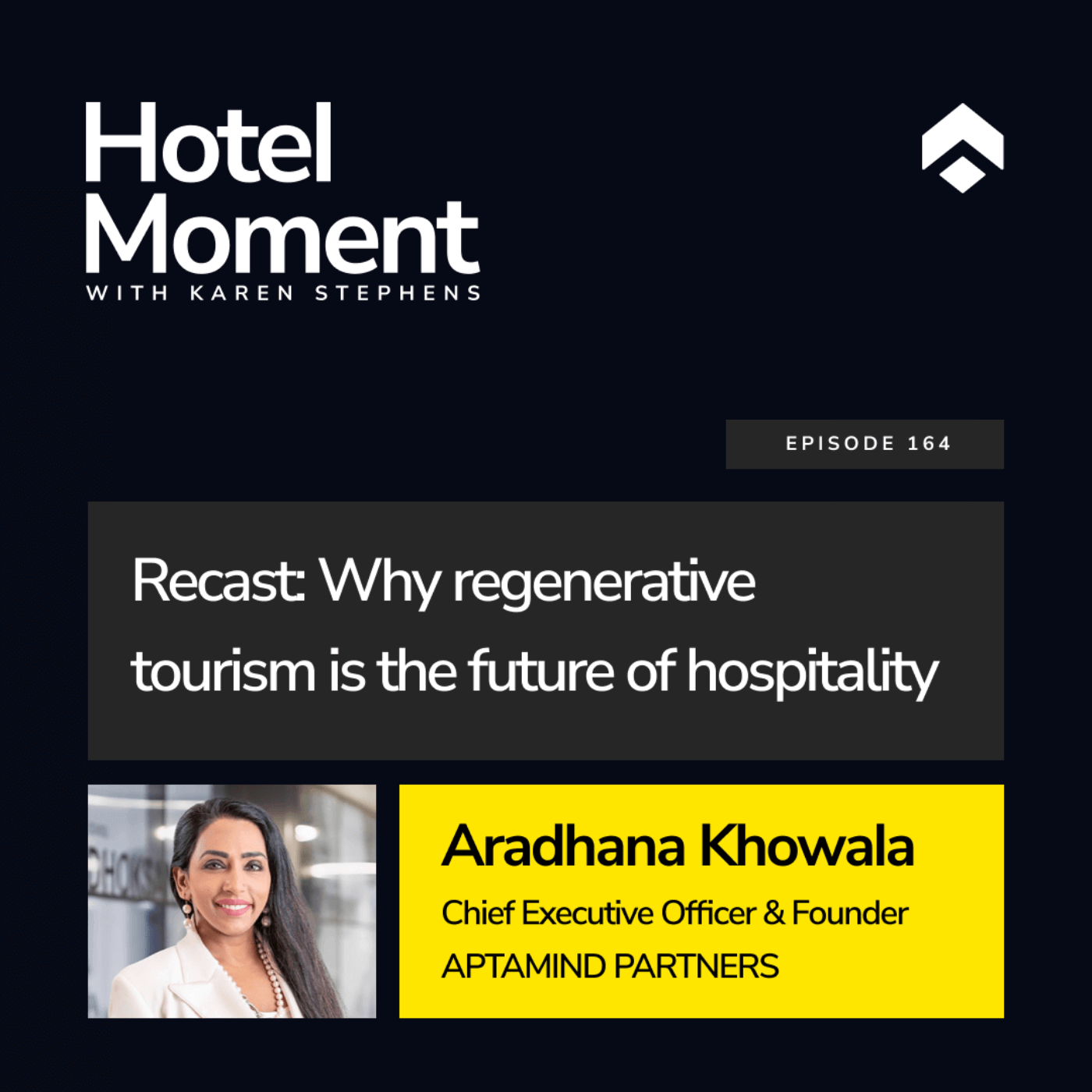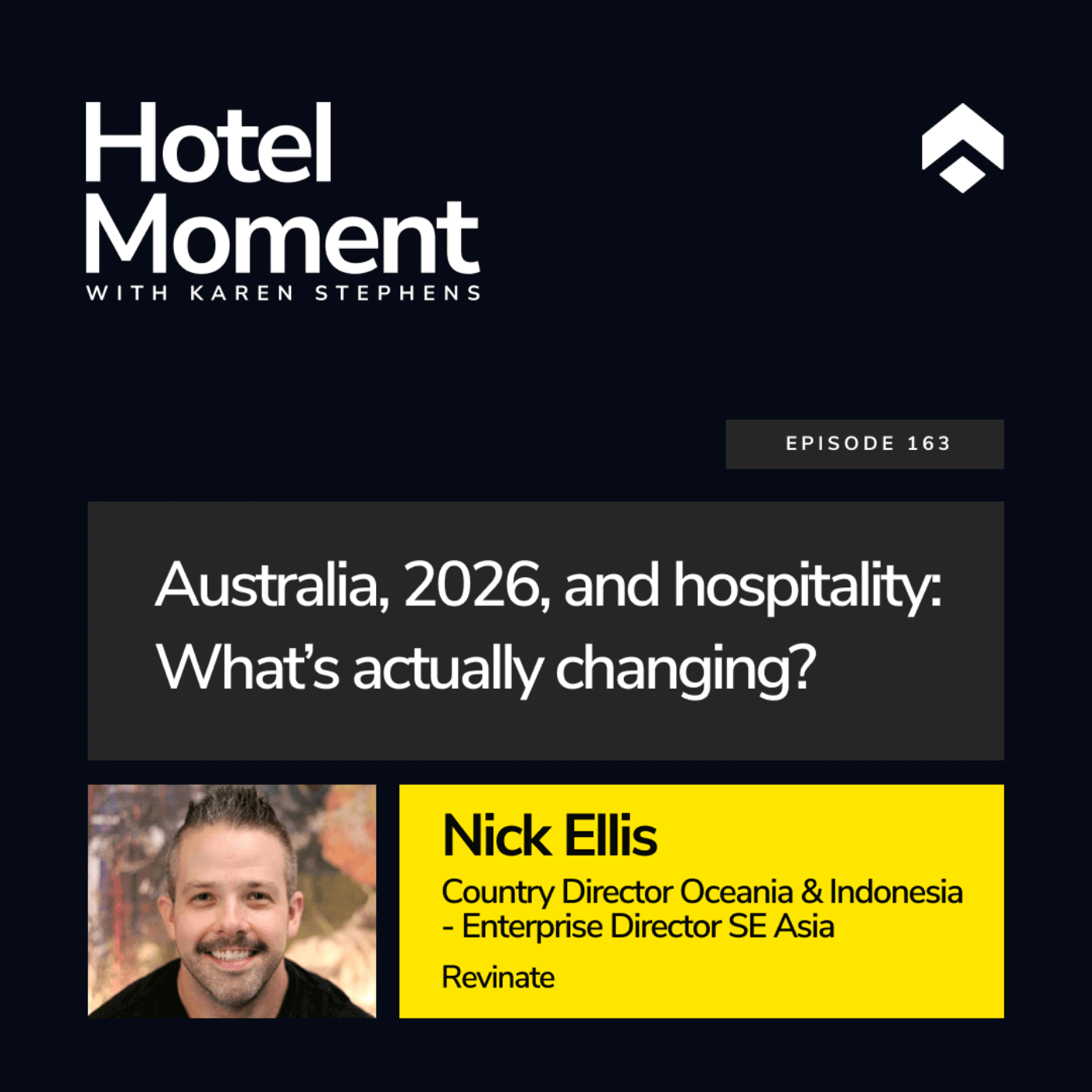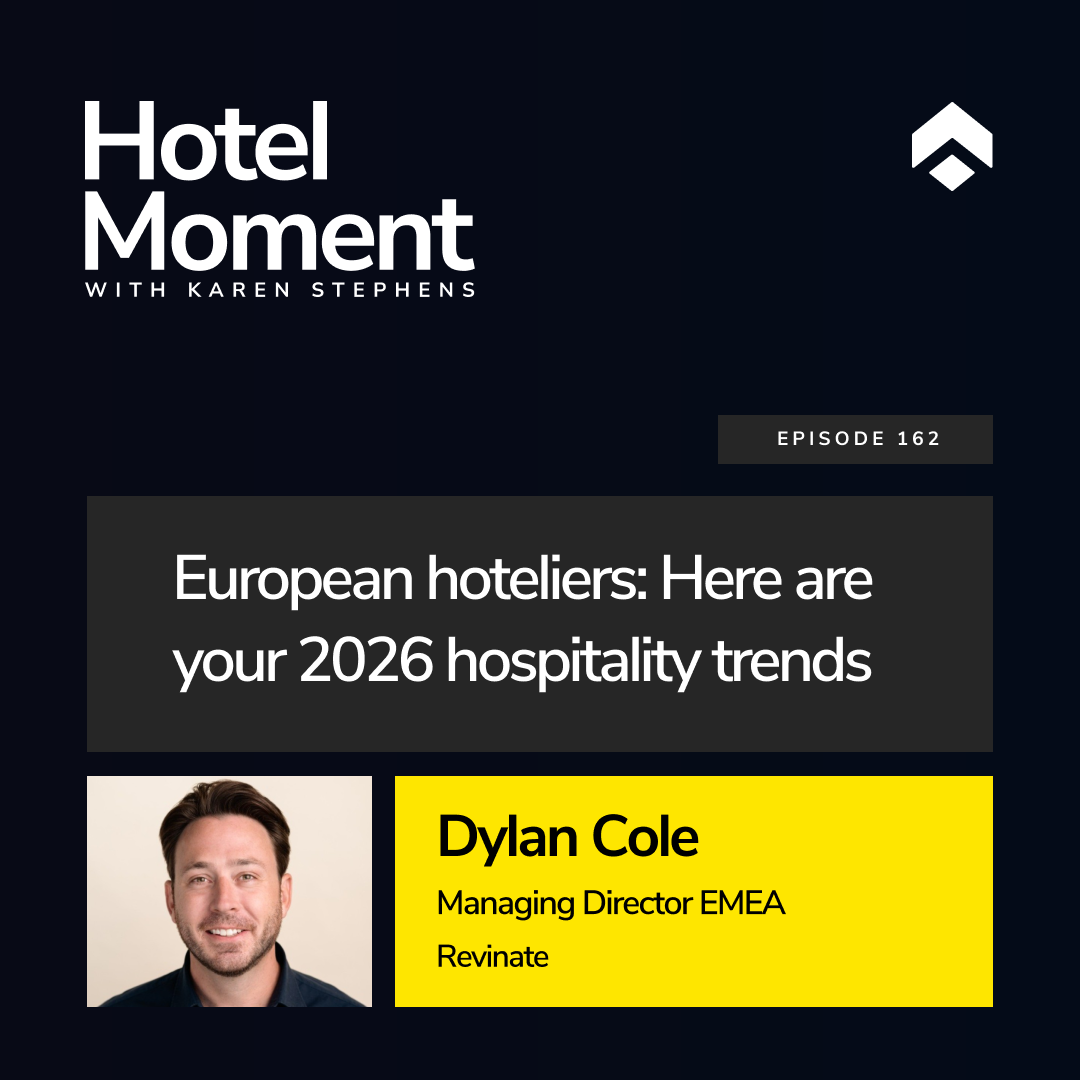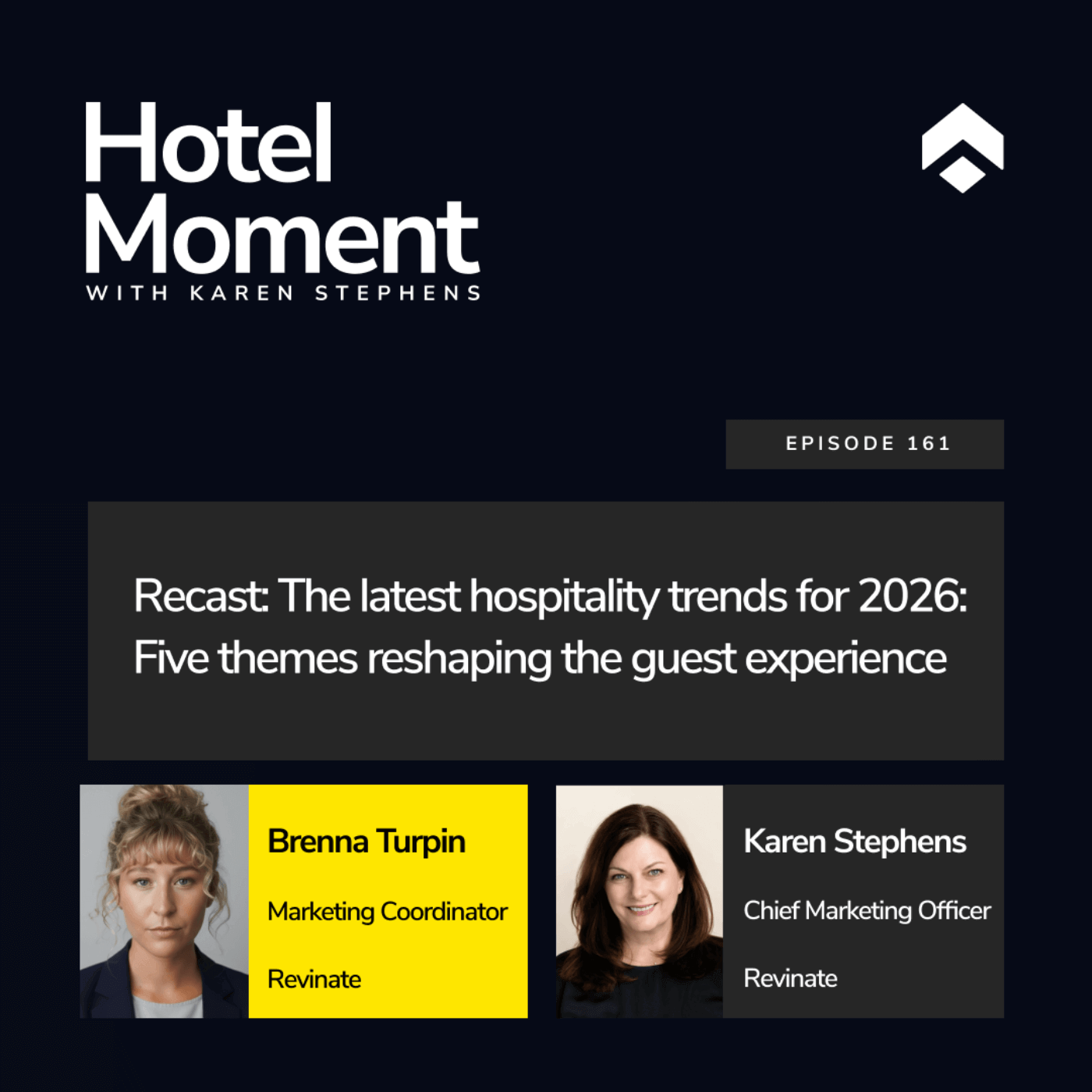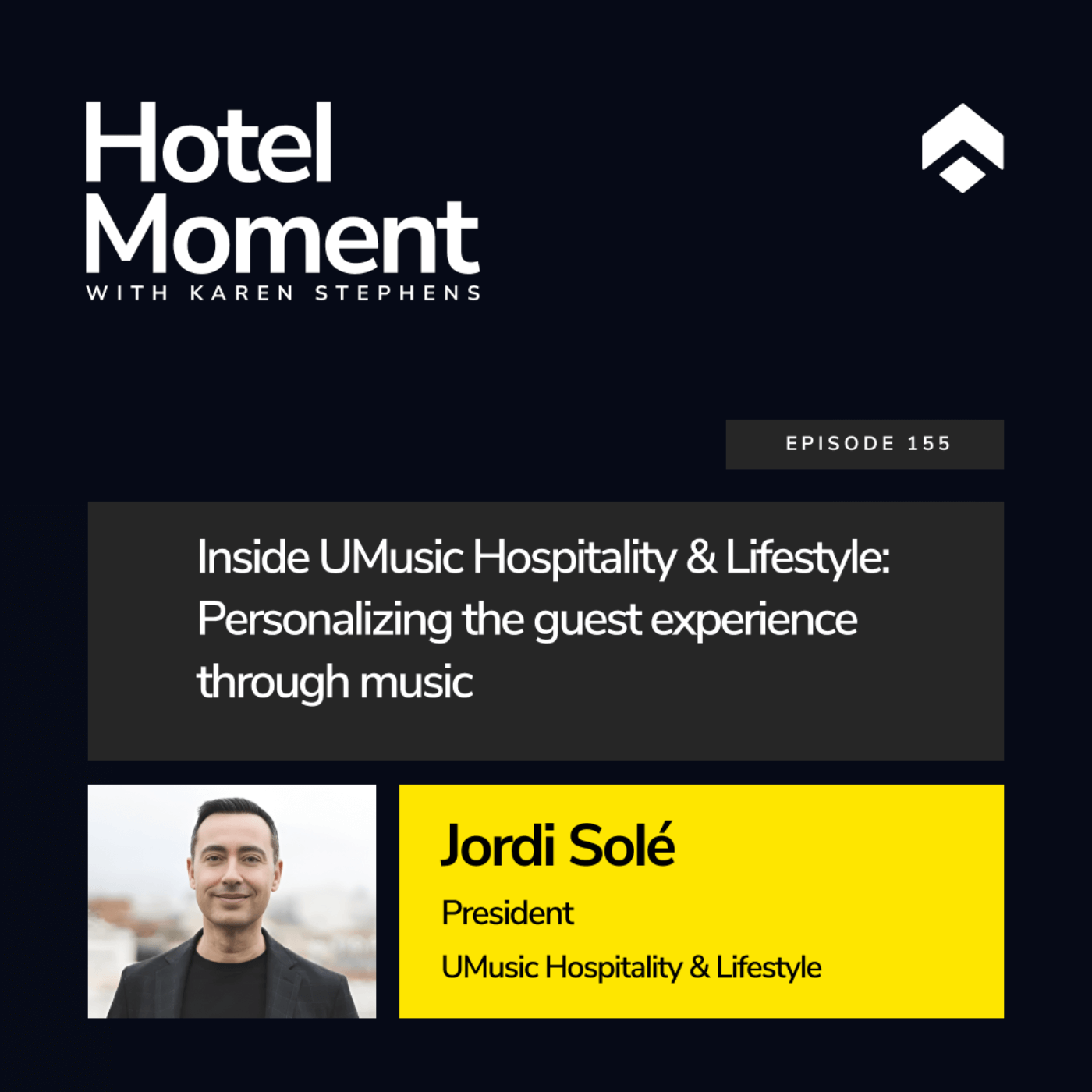Hotel Moment
WITH KAREN STEPHENS


Episode 153
Service as a strategy: How to drive more revenue with frontline staff
In this week’s episode of Hotel Moment, Geoffrey Toffetti, CEO of Frontline Performance Group, joins Revinate CMO Karen Stephens, with direct advice for hoteliers looking to improve their ancillary revenue.
Geoffrey urges hoteliers to focus on service first — citing the correlation between improving service scores and revenue growth. Because hoteliers who treat every stage of the guest journey as an opportunity to exemplify extraordinary service become a highly favored, loyal brand.
And Geoffrey also encourages frontline staff— F&B, reservations, and the front desk — to work together, share data, and personalize touchpoints for a unified approach to ancillary revenue generation. Executing on strategy doesn’t happen in silos.
Tune in to find out what happens when your frontline becomes service-oriented, creating a win-win-win for your hotel.
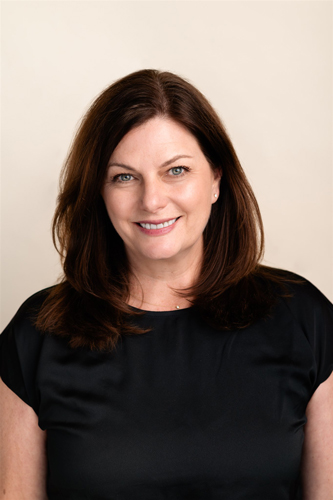
Meet your host
Karen Stephens
As Chief Marketing Officer at Revinate, Karen is focused on driving long-term growth by building Revinate’s brand equity, product marketing, and customer acquisition strategies. Her deep connections with hospitality industry leaders play a key role in crafting strategic partnerships. Karen has more than 25 years of expertise in global hospitality technology and online distribution — including managing global accounts in travel and hospitality organizations such as Travelocity and lastminute.com
As the host of The Hotel Moment podcast, she interviews top players in the hospitality industry. Karen has been with Revinate for over 11 years, leading our global GTM teams. Her most recent transition was from Chief Revenue Officer, where she led the team in their highest booking quarter to date in Q4 2023.
Watch the video
Transcript
[00:00:00] Geoffrey Toffetti: Optimizing every aspect of the guest experience from the moment they touch your brand, whether it be the first phone call, the website, all the way through to the walk-up to the hotel, the lobby condition, the room. All of that is service.
[00:00:17] Intro: Welcome to the Hotel Moment Podcast, presented by Revinate, the podcast where we discuss how hotel technology shapes every moment of the hotelier’s experience. Tune in for our guest episodes where we explore the cutting-edge technology transforming the hospitality industry and hear from experts and visionaries shaping the future of guest experiences. Alongside our conversations with guests we have episodes for you, hosted by Revinator Brenna Turpin, on resources available to you all. These resource-packed episodes have granular advice on overcoming industry and operational challenges so you can emerge as a hotel superhero. Whether you’re a hotelier or a tech enthusiast, you’re in the right place. Let’s dive in and discover how we can elevate hospitality together.
[00:01:03] Karen Stephens: Hello and welcome to the Hotel Moment Podcast. I’m your host, Karen Stephens, the Chief Marketing Officer of Revinate. And today we’re excited to speak with Geoffrey Toffetti, the CEO of Frontline Performance Group, a global leader in optimizing hotel revenue through service-driven sales programs and frontline team performance. With decades of experience helping top hospitality brands like Hilton, Hyatt, and Marriott, Geoffrey leverages technology, training, and analytics to drive measurable results while enhancing both the guest experience and employee engagement. He is recognized for his expertise in harnessing AI and SaaS solutions to elevate hotel operations and profitability. Geoffrey, welcome to the Hotel Moment Podcast.
[00:01:47] Geoffrey Toffetti: Thank you. It’s great to be here.
[00:01:48] Karen Stephens: Well, thank you for joining me. So I’d love to just jump right in here. As I mentioned in the intro, you’re the CEO of Frontline Performance Group. And I we definitely want to dig into what that is all about. But before we do that, would love to understand how your journey in hospitality led you to technology and focusing on the front line.
[00:02:07] Geoffrey Toffetti: Wow, that’s a great question. So my first real job, if you take out like mowing lawns and stuff, was at a hotel called the TradeWinds Resort in St. Pete Beach, Florida. Big sprawling resort property. I started as a valet and worked my way up, got to the front desk, night audit, then into management. And so I was really on a track toward GM when I left hospitality because a coworker had left and was working for another company and they were starting a company. And they thought I would be a good fit because I was one of the only really computer savvy people at that time. We’re talking nineteen ninety-nine. And I had a service background. So they’d recruited me to Orlando for a startup that had nothing to do with hospitality. And I was there until 2011, we sold the company for the second time and got introduced via a contact with the founder of Frontline Performance Group, Ziad Khoury. And they weren’t doing anything in hotels and yet what we do, you know, helping companies generate more revenue at the point of sale, having been a front desk agent, for me, I was like, we need to be in hotels because I know that you can make a lot of money at a front desk doing upsells. But no one was doing it. So when I joined the company, it was of the mission really to open a hospitality vertical. The business had already been around for twenty-four years or something, and they had never worked in hotels. So there was a lot of green space for me to come into the business and do that. And we’ve done it successfully. And now ninety percent of our business is hospitality. It’s our sole strategic focus is growing our hospitality practice. So that’s how it came full circle back to the front line is I was a frontline person at a hotel and this company that was very unique that it works with frontline employees. It just made sense. And then in my last company when we sold it, the reason we got it such a great value is we had converted from services to technology largely. So I had already done that. And then at Frontline there was no technology. We were using spreadsheets and Microsoft Word. We were a consulting and training company. So we started building tech to enable our consulting practice. And then in COVID it made sense. We couldn’t go on site. We couldn’t do in-person work for two years. We converted to a SaaS forward model. And that’s how we ended up in technology in the frontline.
[00:04:29] Karen Stephens: Wow, that’s really interesting. It’s so funny how you know, I know we have a lot of young listeners, folks who are coming up in hospitality listen to this podcast, and I always like to point out you never know where that career is gonna go.
[00:04:39] Geoffrey Toffetti: That’s exactly right.
[00:04:41] Karen Stephens: You never know the people that you meet. And really interesting how you’re kind of tying back, hey, I worked at the front desk because it really is a captive audience for I mean, you’ve got people checking in. they’re going to be on property for a certain amount of time and if you’ve got services to offer, what’s the best way to get that across? So can we talk a little bit about that? You mentioned that you have a combination of services training plus technology. So just give me an idea of what the approach is when you’re onboard with a customer.
[00:05:07] Geoffrey Toffetti: Yeah, so we’re tech forward now. So the primary basis of the product is our platform called Engage. And in there is a learning management system and an analytics platform. It also manages incentives and goals. So when we onboard, we bring the team onto the platform, the front desk employees can see their own productivity, they can see how much they’re earning in incentive, they can manage their goals, and they also have access to a vast library that can help them. They’re all little short videos that are very skill specific on how to engage the guests, the right way to say things. There’s a science to it. As we say, sales is not magical, it’s procedural. And if you could teach the procedure and you integrate it into the natural check-in process, which is what we do, it becomes very natural to sell because if, for instance, someone walks into the lobby and they’re trailing a couple of teenagers behind them and you know they booked a double double in your hotel, it is going to benefit that family to have a suite. There’s no question that is a value add or an adjoining room. So if you’re a front desk agent and you view the world that way and you say, what can I offer my guests that are actually going to improve their experience? You’re serving, you’re not selling, but you get rewarded because the more that someone spends above their reservation, you can be rewarded for that. But we believe very strongly that sales and service are two sides of the same coin when done properly. When you’re selling something, even me or you, if we’re out selling to a customer and we’re trying to sell them something they don’t need, that’s sales. If you’re trying to provide a solution to a problem they have, that’s service. So we view the whole, that’s our worldview about revenue in hotels.
[00:06:44] Karen Stephens: Wow, that aligns beautifully with Revinate as well. We have a call center software that’s a similar idea. So when someone calls in to make that reservation, you’re able to see enough about the guest to really offer because we like to say you know the stay starts at the reservation. So it’s really transforming that reservation agent from an order taker to a revenue maker is what we like to say. And that’s our little catchy phrase. But it’s the same concept that you have somebody and it’s there to enrich the guest experience. So what you’re doing is also in service of the guests to make sure that they have the best absolute time that they can have on property. So it’s a similar similar idea.
[00:07:21] Geoffrey Toffetti: It’s exactly the same idea. I mean, we might be coming more from a training DNA versus a revenue management or technology DNA, but we’ve arrived at the same place, is you want the person on the front line to be the ambassador of your brand and you want them to be a service advocate for the guest, that comes with more revenue. I mean there’s studies that show the more you pay for something, the more you enjoy it on average. It’s because you’re getting a better product normally. So in our programs, we see, and I’m sure you guys see this too, a very strong correlation between when the revenue is going up, the service scores are going up because you’re training people to do it right, to do it well. You’re giving them the tools to do it right. And it’s just a win win. We used to have a five-win wheel. It’s a win for the agent. It’s a win for the guest. It’s a win for the hotel. It’s a win for us. It’s a win for the owner. So it’s everyone’s winning, as long as you’re doing it right and you’re not being too pushy and you’re not trying to wield our superpower for evil, but for good.
[00:08:16] Karen Stephens: Yeah, that’s right. Don’t be too pushy. That’s right. You mentioned owners, I think the other thing that’s a hot topic now, certainly in the US market with what we’ve seen with RevPAR with occupancy, it’s been a little rocky ride, but ancillary services are really that’s where it is. You know, at this point it’s all about how do you really make sure that you’re increasing the share of wallet for lack of a better word for the guests that come on property? So can you talk to me a little bit about when you’re talking to ownership and you’re talking about the value of putting in this kind of technology what you focus on in terms of analytics and all that good stuff.
[00:08:48] Geoffrey Toffetti: Yeah, obviously RevPAR is a big measure. Everyone uses it. We actually don’t prefer RevPAR. We prefer TRevPAR. For any of the young hoteliers out there, RevPAR stands for revenue per available room. So you just take the total rooms revenue, and this is why we don’t like it. It’s isolated to rooms revenue in that metric, and you divide it by the available room nights so the rooms that were open for sale whether occupied or not in whatever period you’re measuring. TRevPAR is total revenue per available room. So it takes the entirety of the hotel’s revenue and does the same thing. And I think it’s starting to get a little bit more traction in the C-suite. We’ve heard it in conferences now. And it’s getting closer to what theme parks do. Theme parks, they measure everything on a per capita revenue basis. So you walk through that gate. They are dividing what you spend into one, which is you, and they’re getting to revenue per guest. And I think ultimately that’s sort of the direction that we’re trying to steer the ship. Because then it allows you to integrate your different revenue centers into a cohesive strategy. Rather than food and beverage is doing its thing and front desk is doing its thing and reservations might be doing its thing. It’s all one ancillary revenue approach. And we’re actually rolling out food and beverage right now, which is really exciting. And to do the same, they just help servers and bartenders sell more effectively. We also use a metric called IDR that we created. It stands for incremental daily revenue, which is basically ADR for ancillary revenue. So you take your total front desk revenue, divide it into occupied room nights. And then further, we take that and divide it into the ADR and we get an index value. And that allows us to benchmark a luxury hotel against an upper mid scale hotel because you’re normalizing for price and occupancy. And it allows us for portfolios like owners to say, yeah, obviously your beachfront luxury resort is doing more than your airport mid scale in revenue, but your airport mid scale is actually selling more effectively for the opportunity. So that’s really important to us as benchmarking. And we’re also working on a metric similarly that will allow owners and managers of restaurants to benchmark performance in the same way. Is your steakhouse really better than your barbecue joint or not? And there is no metric right now in food and beverage for that, and there wasn’t in front desk. So we’ve had to invent them.
[00:11:06] Karen Stephens: That’s really interesting. So I’d love to understand a little bit more. So we have obviously property management systems, point of sale systems, which are a lot of ’em if you’re not watching us on YouTube we’re both.
[00:11:16] Geoffrey Toffetti: They were born before I was.
[00:11:20] Karen Stephens: So can you talk a little bit about how do you integrate all of that data? You know, I’m really curious because what Revinate does, we hook into systems and we pull that in. For us, the center of the universe is the guest. So the guests as they move across different hotels, different groups, what is the rolled up spend, preferences, room nights, all of the things into one single view of the guest profile for marketing activities. Sounds like what you’re doing is looking at the outlets and the revenue spend and the indexes across. So can you talk a little bit about how your platform integrates with those systems?
[00:11:52] Geoffrey Toffetti: Yes, similarly we pull data from the PMS or POS. We don’t have a lot of bi-directional need because we’re not writing back. We’re analyzing performance, but we’re pulling the data in and we’re visualizing it in our platform in a very kind of UX forward way that’s very intuitive. And more recently, we’re deploying, as we speak, an agentic AI layer that is actually taking it another level to take the analytical burden off the customer and present back instead of analysis, present back action. So tell them what the data says, but then tell them what to do about it and do it at scale. It’s one thing to be able to do analysis for someone and tell them here’s your action plan and do it on a consultative basis, that’s not very scalable. So to be able to do it at scale, AI is unlocking that for the first time, really, I think, in human history, that you can scale up detailed personalized analysis. So that’s what we’re doing. And we’re focused on the behaviors of the front line that are helping or harming revenue flow. And getting very, very specific in its diagnosis. So I’ll give you a really simple example. If you’re a front desk agent and you have a lot of upsells, but your average rate is $30, and you have someone else that doesn’t do very many, but their average rate is two hundred dollars. You can infer from that what’s wrong in those equations. One is they’re selling a one-tier product, they’re comfortable selling, they have a dialogue down pat and they’re just churning it. And over here, this person’s trying to profile the guest and only sell them the highest end suites. Both of those are wrong, but they’re different issues. And so the system can diagnose it and then give feedback to the manager to say you need to do this with this person and this with this person and have them watch these videos that will address those very specific skill deficits. And we do that across a dozen or two dimensions so that it gets very, very narrow and very, very specific. So you’re guest centric on what does the guest need or want or like. We’re saying what does the employee do well and what don’t they do well that will drive the mission? So we’re sort of related, but not exactly. We’re two sides of the same coin again.
[00:14:01] Karen Stephens: It isn’t. And you know, I think what’s so cool about the evolution of technology, where we are today, as you mentioned, AI obviously coming on. It’s been around for a long time, but now the rapidity, what we’re seeing now with agentic AI and how quickly you can add these applications. I think that’s very interesting. And then you do start to see technology companies like ours, two sides of the coin. And then the next question is how does that all come together? So of course we’ll have a little conversation after this podcast.
[00:14:27] Geoffrey Toffetti: Yes. I was just thinking that we have to talk we have to talk about that.
[00:14:30] Karen Stephens: We’re like, wait, what do you do?
[00:14:31] Geoffrey Toffetti: So I was actually thinking the same thing. Yeah.
[00:14:34] Karen Stephens: How quickly it can move. All right, so now we’ve got the frontline employees. So it’s like a learning management platform, an LMS that is also a system that is also attached to that. So if a manager says, okay Bill, you need to watch these three videos and I can see over time your improvement. Is there a way for that manager to understand that they’ve done that and track the progress?
[00:14:56] Geoffrey Toffetti: Yeah, there’s a native LMS built directly in the platform. So we are unique in that we don’t see ourselves as an LMS company because we don’t let people use our LMS. It only houses our stuff. But it’s very unique in that it actually ties outcome to learning. It’s very difficult for training companies to deliver their training and then know definitively if it worked or not. And we can close the loop. So that’s another thing that AI is helping us with is monitoring that in real time to say we recommended this video about top-down selling or selling above two categories. Now we’re going to go back and remeasure that issue. Do we see it improve or not? And it allows us to do two different things. One, check the validity of the learning content, which it might or might not be effective. And or check that maybe there’s something else going on with that employee that is not allowing them to progress out of that situation, or at least the manager can see they watched it but they didn’t improve or they didn’t watch it. So yeah, you’re exactly right. It’s monitoring learning and performance all as one concept.
[00:15:59] Karen Stephens: Yeah. I always say, you know, that’s my biggest whenever you’re trying to enable, whether it’s a Salesforce or a hotel front lines or whatever. If you’re not closing the loop and ensuring that people have actually done the work and I want to say adjusted, but you know, have taken on board the learning and applied it. What’s the point? You can’t just like check out a video and hope that it lands.
[00:16:21] Geoffrey Toffetti: Surprisingly, that’s probably the most common realistic real-world scenario is managers or companies will deploy training and check a box and say, okay, we did training and they have no way to get a feedback loop to say did the training even add any value or not. And maybe productivity spiked a little for three weeks and then it went back down because there is a little effect of training that on performance, but it doesn’t stick. That’s why for us, even before we had technology, we used to say training is 10% of the equation. It’s the follow-up, it’s the consistency, it’s having a process that they can follow, it’s having a North Star that they’re working toward, a goal of some kind. All of those things come together to drive performance, but certainly training is a significant component and most companies struggle to evaluate whether it worked or not. And because our system’s together, it’s all part of the same data structure.
[00:17:13] Karen Stephens: There you go. And I think too, I mean, we know turnover, especially for frontline staff in hotels. I mean, it’s an entry-level position. people tend to turn through. So if you don’t have an effective way to train and verify and keep moving, you know.
[00:17:26] Geoffrey Toffetti: That’s right. Yeah, because you imagine you bring in a training company to do this great training, the next day someone quits and someone new comes in. They didn’t get that training. So you have to have it in a repeatable, accessible way. There’s a mobile app so employees can listen to the training while they’re on the bus or while they’re commuting. Like we make it as easy as possible for them to consume it. But yeah, I mean turnover is crazy and like you were saying, go from being an order taker to a revenue maker. I love that. I’m not gonna steal it, but I think that’s really clever. But it’s more than just training because once they have success, they tend to crave more development. Those that actually embrace a program like mine or yours, they usually make a lot more money. And it changes the profile from an entry-level position to like a mid-level position. We have front desk agents that we work with that make $100,000 a year. They’re not paid any more than anyone else on their hourly. They’re just that good at selling. And so it elevates the role, it reduces turnover, it makes for a better environment. It’s a very virtuous cycle once you get some activity going.
[00:18:28] Karen Stephens: Right. And it makes it fun. I think too, you know, sales is not an easy role, but the people who thrive understand that it’s like a quick hit every time. Every time you’re able to encourage that person to take the next level and like you say incremental commission even in small chunks like that huge incentive for your team and you’re gonna make more money. If they’re making five percent, you’re making 95 or whatever the number is, right? So that’s really cool. So I’d love to understand a little bit more. So you have the PMS. Are you embedded in the like how does it work when if I’m the frontline person and I’m using your software and somebody approaches me? How do I use it?
[00:19:03] Geoffrey Toffetti: Yeah, so everything is transacted in the system of record, the PMS or the POS. We don’t interfere in the workflow. We do have some solutions that where the PMS or POS allows, we can put prompts in, but really it’s their workflow, it’s in that system. Ours is more after the fact what has happened. How did you do and what can you do to improve? And we always make it about how can you as a frontline employee make more money? Because the what’s in it for me factor is very real. And we have a concept that we like called discretionary effort. We define it as the difference between doing a good enough job to never be fired or giving it everything you’ve got and being the best employee you can possibly be. And that difference is at the discretion of the individual. So the key to leadership and management and all of these theories is how do you unlock that? How do you get them to be more engaged and give you more? And so our entire philosophy and ethos is about unlocking that discretionary effort. And financial reward is one of them. Recognition is another. Oftentimes people go unrecognized, particularly at the front line. They’re almost viewed as like a necessary expense, but they’re not viewed as a revenue center. And the other’s accountability. How am I doing versus my peers? Am I contributing to the mission of the team? So you put those three things together and you can really motivate someone to perform, even if they’re sort of skeptical or cynical, you can break through if you leverage those three concepts in tandem. And that’s what our system was built to do.
[00:20:34] Karen Stephens: I love that. So you do the training up front. Everybody understands how they drive this. You’re on the back end, you’re metricing rewarding people, floating that up to ownership and management companies, and then the hotel managers can make the tweaks to the team to improve the numbers, improve the performance.
[00:20:50] Geoffrey Toffetti: Correct, exactly. You just nailed it. It is cool. And it’s fun because you’re helping people. Like people really are frontline employees. It’s life-changing for some of them. I mean, they double their income. They’re able to put their kids in a private school or they’re able to upgrade their apartment. I mean these are real world benefits that front desk agents are realizing because we think of front desk as an entry level role, but most of the front desk agents or half of them are over 30. When in some environments where it’s like a legacy union environment, they might be in their forties or fifties. And all of a sudden they can make another five or six, seven hundred dollars a month or even thousands more a month. It’s life changing.
[00:21:27] Karen Stephens: I think too, and I, you know, I’m the one who said entry level, and I should also say that I know definitely for our customers in the luxury in that segment the folks that do those jobs are so in love with guest experience and really providing I mean that’s why those hotels deliver that kind of experience. It’s about the people. It’s about the people who genuinely get up in the morning to provide a wonderful experience. And of course that shouldn’t be expected just, I mean, you know, we all need to get paid and you can do both, right? Two things both can be true. You can also make incremental income on that and still really have that passion and love for it, right?
[00:22:02] Geoffrey Toffetti: Absolutely. The people that put themselves on the front line in hospitality, they love people and they want to be of service. And that’s why sometimes there’s a limiting belief when we first meet a team that doing sales is bad for the guest. And we have to overcome that. And once they get it. Here’s a great story, this true story. The first hotel we ever worked in was a very iconic luxury hotel in New York City. And there was a front desk agent that had been there for 42 years. He was in his 60s. And this is when we were going on site. When we got there, his arms were crossed, very negative body language, very cynical, until he realized that what we were describing is actually service. Because he viewed himself as a pinnacle service delivery person. Like great service. He said this. For forty-two years I’ve been doing a disservice to my guests because I haven’t been educating them on what their alternatives are. And he became the number one seller in the hotel. He’d more than doubled his income, transformed him because it was that perception that sales is bad and service is good. Not knowing the best service you can offer is offering your best service.
[00:23:16] Karen Stephens: So who better to tell you how to do that than the people working there.
[00:23:19] Geoffrey Toffetti: So very cool.
[00:23:21] Karen Stephens: So I have a question. Who are your buyers? Are you able to work across all brands, all management companies, or do you have any like I know sometimes with technology companies you’re blocked getting access to the PMS or you can’t get into this or that because of the global brand. So can you tell to everybody?
[00:23:38] Geoffrey Toffetti: We are very fortunate. I would say half of it is our skill and diligence and half of it is some luck. We are approved in every major brand. And we are like the primary provider for three of the biggest hotel companies in the world. So we don’t have any obstacles at this point. I mean, there are a few domestic brands in some of the major countries like Brazil or China that we don’t work with their biggest domestic brands yet. But the global international brands, we’re on the vendor list for all of them.
[00:24:12] Karen Stephens: Well, that’s huge. Yeah, you know better than most. I know. I know. Definitely. I definitely do. So that is fantastic. Wow, that’s great. And so then typically you I assume you sell to ownership companies, shell management companies.
[00:24:20] Geoffrey Toffetti: All of the above, we’ve been very intentional about cultivating relationships with the brand, the management company, even if it is the brand management company and the owners. And even you might even put a fourth category, the asset managers, because there are some really big asset management companies. And basically they all win. So it doesn’t really matter who we’re selling to, but the value prop as you describe it might all change between a management company and an owner. But yeah, we have relationships with every major third-party management company or many of the biggest REITs and owners in the world. Several of them mandate us into any hotel they acquire. So yeah, we’ve been really fortunate there and now we’re focused more on scaling the business than and our food and beverage rollout is key because we work with approaching three thousand hotels now and in those three thousand hotels are like nearly eight thousand restaurants and bars. Full service. So it’s a need they have revenue in or profit contribution from food and beverage and hotels is fairly low on average. Some don’t ever make a profit. So there’s a huge need for something like what we’re doing where you can the same guest, the same employee, the same menu make more money. And that’s been our bread and butter.
[00:25:31] Karen Stephens: That’s so cool. It’s so funny the parallels just because our focus has been also just on ancillary, whether it’s restaurants or golf or spa or whatever it might be. But again, it’s what is the guest ordering? What are their preferences? How do I know from one hotel to the next that this person drinks Cabernet and like steak and this other person’s a vegetarian who has children. So you can kind of from a guest perspective.
[00:25:53] Geoffrey Toffetti: Right. It’s very interesting. There’s some kind of synergy to be had here because you have the intelligence and we are working with the people. If that could be fed more effectively to the front line, then revenue would be affected.
[00:26:05] Karen Stephens: That’s all we do. Oh, very cool. Okay. So beyond technology and metrics, what do you believe is the most overlooked factor in achieving exceptional guest experience beyond all of that.
[00:26:16] Geoffrey Toffetti: Yeah, I think it’s probably recognition, well, the definition of what is service. I would start there. I think there’s misconceptions and inconsistencies around what is service. A lot of people, and we’ve encountered them, they believe that the people talking to the guests directly are responsible for service. And I say it goes way beyond that. It’s every single person that affects their experience. And if we could get to a more holistic view of that, and I think obviously the super luxe hotels get this completely, but a huge swath of the market does not. They don’t understand that a piece of garbage in the parking lot might be more detrimental to service than someone being rude at the front desk. It’s really how does the guest perceive it, but optimizing every aspect of the guest experience from the moment they touch your brand, whether it be the first phone call, the website, all the way through to the walk-up to the hotel, the lobby condition, the room, all of that is service. And I think it’s often scapegoated to the couple of people talking to the guest that you might get a bad review. And a lot of times you look at the reviews, it’s not even about the people, it’s about the environment. And so both, I think that’s a big misconception, is that it’s just about the people talking to the guest.
[00:27:30] Karen Stephens: Yeah, I think that that’s true. I mean our Revinate’s roots is in online reputation from back in the day. And when you read the negative reviews, you’re absolutely right. Like my flight was delayed and then the taxi came and then by the time they get there. But you’re right, perception and it’s 100% of what they, you know, that has to be considered when you think about all that stuff. Okay, my final question for you. What is one lesson from your experience that you wish every hotel owner understood about maximizing revenue through their staff?
[00:28:00] Geoffrey Toffetti: Wow. That it’s way more impactful than you ever imagined it could be. There are some studies that show 70% of the GDP of the United States flows through the front line, and yet they’re one of the most underappreciated, underdeveloped. And not only can they affect your revenue and service right now, they are the future leaders. So if you don’t invest in them and they stay and they run up through the management ranks of your company, you might be promoting mediocrity because you haven’t invested enough in the front line. But the thing that I think is they are your brand. They are the perception that your guests have of you. So I know it’s enticing to try and build a fancier lobby or have the most beautiful chandelier, but if the front desk agent is rude, they don’t see the chandelier anymore. So they really are the manifestation of your brand is your front line. And if you take it more seriously, it can be transformative to your performance, especially going into a market with headwinds on RevPAR, as we mentioned. Your people are your differentiator. It’s not your decor. I mean decor is important, but it’s not your decor. It’s your people.
[00:29:10] Karen Stephens: Your people. I love it. The answer’s in plain sight. Well Geoffrey, it’s been a real pleasure. Thank you so much for the conversation.
[00:29:16] Geoffrey Toffetti: Karen, thanks for inviting me. Appreciate it.
[00:29:22] Outro: Thank you for joining us on this episode of Hotel Moment by Revinate. Our community of hoteliers is growing every week, and each guest we speak to is tackling industry challenges with the innovation and flexibility that our industry demands. If you enjoyed today’s episode, don’t forget to subscribe, rate, and leave a review. And if you’re listening on YouTube, please like the video and subscribe for more content. For more information, head to revinate.com/hotelmomentpodcast. Until next time, keep innovating.

